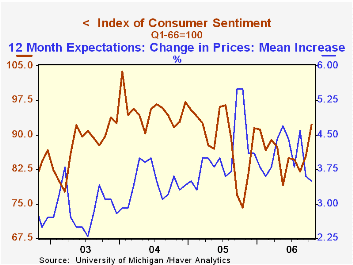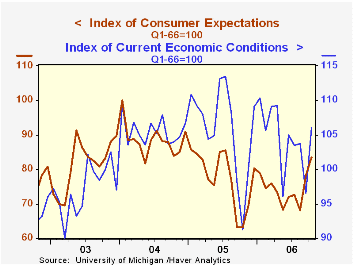 Global| Oct 13 2006
Global| Oct 13 2006U.S. Consumer's Sentiment Buoyant
by:Tom Moeller
|in:Economy in Brief
Summary
The preliminary reading of consumer sentiment in October from the University of Michigan rose 8.1% versus last month to 92.3. That gain doubled September's 4.1% rise and lifted the level to the highest since July of last year. [...]

The preliminary reading of consumer sentiment in October from the University of Michigan rose 8.1% versus last month to 92.3. That gain doubled September's 4.1% rise and lifted the level to the highest since July of last year. Consensus expectations had been for a lesser rise to 86.1.
During the last ten years there has been a 77% correlation between the level of consumer sentiment and the y/y change in real consumer spending and during those ten years sentiment has a 68% correlation with the change in nonfarm payrolls.
Expected inflation during the next year fell further to 3.5% from 3.6% last month, its lowest level since January 2005. Since 1980 there has been an inverse 63% correlation between the level of sentiment and expected inflation during the next year. The five to ten year expected rate of inflation actually rose to 3.6% its highest level since May.
Expectations for the economy rose 6.6% m/m to the highest level since July of last year. Expected business conditions next year improved sharply and over the next five years they improved to the highest since June 2005. The expected change in personal finances added moderately to the sharp gain during September.
The reading of current economic conditions surged nearly 10% m/m and rose to the highest level since April. The current read of personal finances (19.8% y/y) rose to the best level since April and perceived buying conditions for large household goods recouped all of the prior month's decline and rose 15.8% y/y.
Consumers' opinion about gov't economic policy rose 6.1% (11.5% y/y) after three months having been unchanged.
The University of Michigan survey is not seasonally adjusted.The mid-month survey is based on telephone interviews with 250 households nationwide on personal finances and business and buying conditions. The survey is expanded to a total of 500 interviews at month end.Globalization: A Force for Good? yesterday's remarks by Fed Governor Frederic S. Mishkin are available here.
| University of Michigan | October (Prelim.) | September | August | Y/Y | 2005 | 2004 | 2003 |
|---|---|---|---|---|---|---|---|
| Consumer Sentiment | 92.3 | 85.4 | 82.0 | 24.4% | 88.6 | 95.2 | 87.6 |
| Current Conditions | 106.1 | 96.6 | 103.8 | 16.3% | 105.9 | 105.6 | 97.2 |
| Expectations | 83.4 | 78.2 | 68.0 | 32.0% | 77.4 | 88.5 | 81.4 |
Tom Moeller
AuthorMore in Author Profile »Prior to joining Haver Analytics in 2000, Mr. Moeller worked as the Economist at Chancellor Capital Management from 1985 to 1999. There, he developed comprehensive economic forecasts and interpreted economic data for equity and fixed income portfolio managers. Also at Chancellor, Mr. Moeller worked as an equity analyst and was responsible for researching and rating companies in the economically sensitive automobile and housing industries for investment in Chancellor’s equity portfolio. Prior to joining Chancellor, Mr. Moeller was an Economist at Citibank from 1979 to 1984. He also analyzed pricing behavior in the metals industry for the Council on Wage and Price Stability in Washington, D.C. In 1999, Mr. Moeller received the award for most accurate forecast from the Forecasters' Club of New York. From 1990 to 1992 he was President of the New York Association for Business Economists. Mr. Moeller earned an M.B.A. in Finance from Fordham University, where he graduated in 1987. He holds a Bachelor of Arts in Economics from George Washington University.






